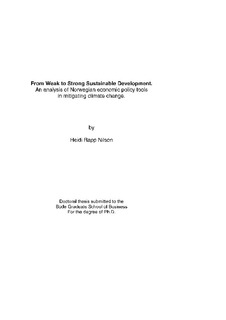From weak to strong sustainable development : an analysis of Norwegian economic policy tools in mitigating climate change
Original version
Nilsen, H. R. (2010). From weak to strong sustainable development : an analysis of Norwegian economic policy tools in mitigating climate change (Doctoral thesis). Bodø Graduate School of BusinessAbstract
This thesis focuses on the economic concepts of weak and strong sustainable
development in relation to mitigating climate change. The overall research question is
how to move from weak towards strong sustainable development. The case studied is
Norwegian economic policy tools in relation to the petroleum industry.
In the mam part of the thesis, vanous aspects of weak and strong sustainable
development are analysed: methodology, ontology, ethics and historical background.
This part constructs the foundation for the following three papers, which all three
contribute to answer the overall research question.
Paper 1 uses circulation economics to illustrate the circular process of carbon capture
and storage (CCS). The research questions are regarding how circulation economics
and strong sustainable development can contribute to the preconditions for CCS. The
situation today remains however, generally speaking, a long way away from
recognizing strong sustainable development as an alternative to weak sustainable
development. A rare exception is the arena of paper 2, the Ethical Guidelines for the
Norwegian Government Pension Fund - Global. The income to the Fund originates
from the Norwegian petroleum industry, and the Fund is a potentially powerful policy
instrument, controlling a huge part of the world's financial assets. The research
questions of this paper analyse mitigating climate change in relation to the existing
ethical base of the Ethical Guidelines, overlapping consensus. Moreover, an alternative
base - discourse ethics - is suggested, to address mitigating climate change in a more
firm manner.
In paper 3, a theoretical model is constructed to make communication and cooperation
between weak and strong sustainable development more even, than is detected in
paper l and 2. The model is called reflexive sustainable development, and is to move
the situation of today towards strong sustainable development.
Description
Doctoral thesis (Ph.D.) – Bodø Graduate School of Business, 2010
